Analysis of Climate Change Impacts on African Food Security
VerifiedAdded on 2022/08/27
|5
|1225
|35
Report
AI Summary
This report provides a comprehensive analysis of the challenges to global food security, with a specific focus on the impacts of climate change in Africa. The report begins by highlighting Africa's reliance on agriculture and the detrimental effects of climate change, including increased population, deforestation, and desertification. It examines the causes of climate change, such as population growth and unsustainable farming practices, and their threats to food security. The report discusses the factors influencing food security (accessibility, stability, availability, and utilization) and how climate change negatively affects them, leading to reduced crop yields, livestock diseases, and food spoilage. It then proposes solutions like organic fertilizers, crop rotation, and the development of climate-resilient crops. The report emphasizes the need for scientific research and sustainable practices to address the ongoing climate change and ensure future food security in Africa. The assignment references multiple sources to support its claims and offers a well-rounded perspective on the issue.
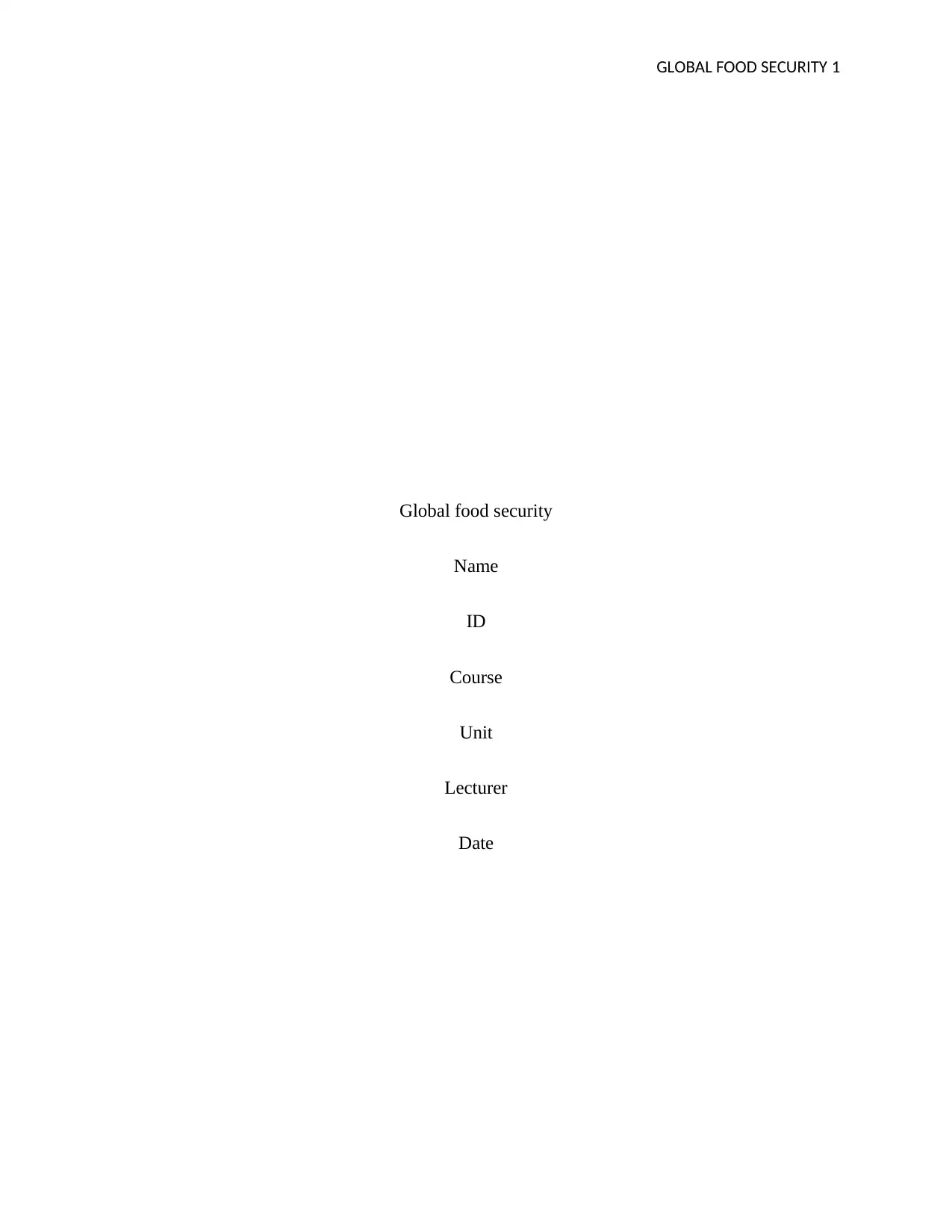
GLOBAL FOOD SECURITY 1
Global food security
Name
ID
Course
Unit
Lecturer
Date
Global food security
Name
ID
Course
Unit
Lecturer
Date
Paraphrase This Document
Need a fresh take? Get an instant paraphrase of this document with our AI Paraphraser
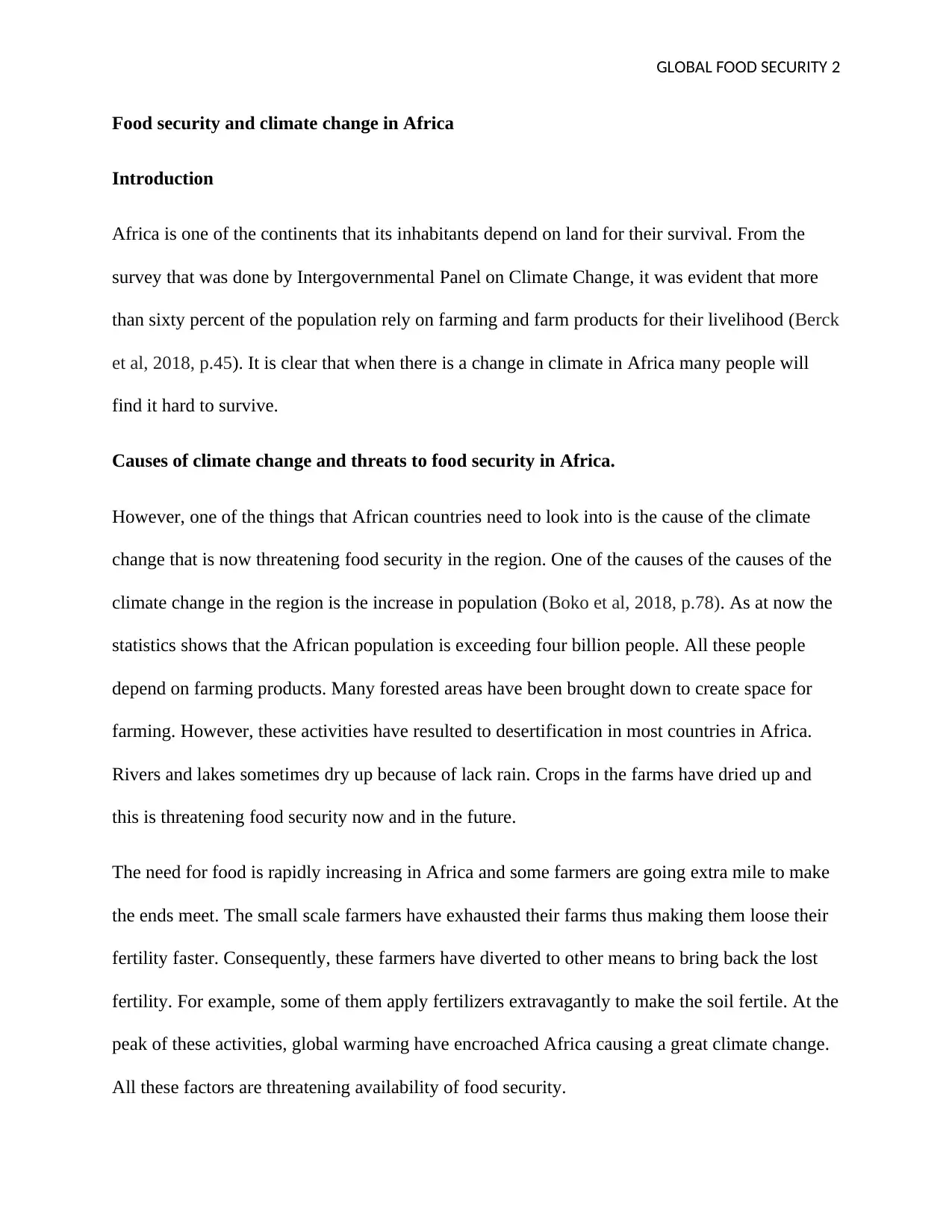
GLOBAL FOOD SECURITY 2
Food security and climate change in Africa
Introduction
Africa is one of the continents that its inhabitants depend on land for their survival. From the
survey that was done by Intergovernmental Panel on Climate Change, it was evident that more
than sixty percent of the population rely on farming and farm products for their livelihood (Berck
et al, 2018, p.45). It is clear that when there is a change in climate in Africa many people will
find it hard to survive.
Causes of climate change and threats to food security in Africa.
However, one of the things that African countries need to look into is the cause of the climate
change that is now threatening food security in the region. One of the causes of the causes of the
climate change in the region is the increase in population (Boko et al, 2018, p.78). As at now the
statistics shows that the African population is exceeding four billion people. All these people
depend on farming products. Many forested areas have been brought down to create space for
farming. However, these activities have resulted to desertification in most countries in Africa.
Rivers and lakes sometimes dry up because of lack rain. Crops in the farms have dried up and
this is threatening food security now and in the future.
The need for food is rapidly increasing in Africa and some farmers are going extra mile to make
the ends meet. The small scale farmers have exhausted their farms thus making them loose their
fertility faster. Consequently, these farmers have diverted to other means to bring back the lost
fertility. For example, some of them apply fertilizers extravagantly to make the soil fertile. At the
peak of these activities, global warming have encroached Africa causing a great climate change.
All these factors are threatening availability of food security.
Food security and climate change in Africa
Introduction
Africa is one of the continents that its inhabitants depend on land for their survival. From the
survey that was done by Intergovernmental Panel on Climate Change, it was evident that more
than sixty percent of the population rely on farming and farm products for their livelihood (Berck
et al, 2018, p.45). It is clear that when there is a change in climate in Africa many people will
find it hard to survive.
Causes of climate change and threats to food security in Africa.
However, one of the things that African countries need to look into is the cause of the climate
change that is now threatening food security in the region. One of the causes of the causes of the
climate change in the region is the increase in population (Boko et al, 2018, p.78). As at now the
statistics shows that the African population is exceeding four billion people. All these people
depend on farming products. Many forested areas have been brought down to create space for
farming. However, these activities have resulted to desertification in most countries in Africa.
Rivers and lakes sometimes dry up because of lack rain. Crops in the farms have dried up and
this is threatening food security now and in the future.
The need for food is rapidly increasing in Africa and some farmers are going extra mile to make
the ends meet. The small scale farmers have exhausted their farms thus making them loose their
fertility faster. Consequently, these farmers have diverted to other means to bring back the lost
fertility. For example, some of them apply fertilizers extravagantly to make the soil fertile. At the
peak of these activities, global warming have encroached Africa causing a great climate change.
All these factors are threatening availability of food security.
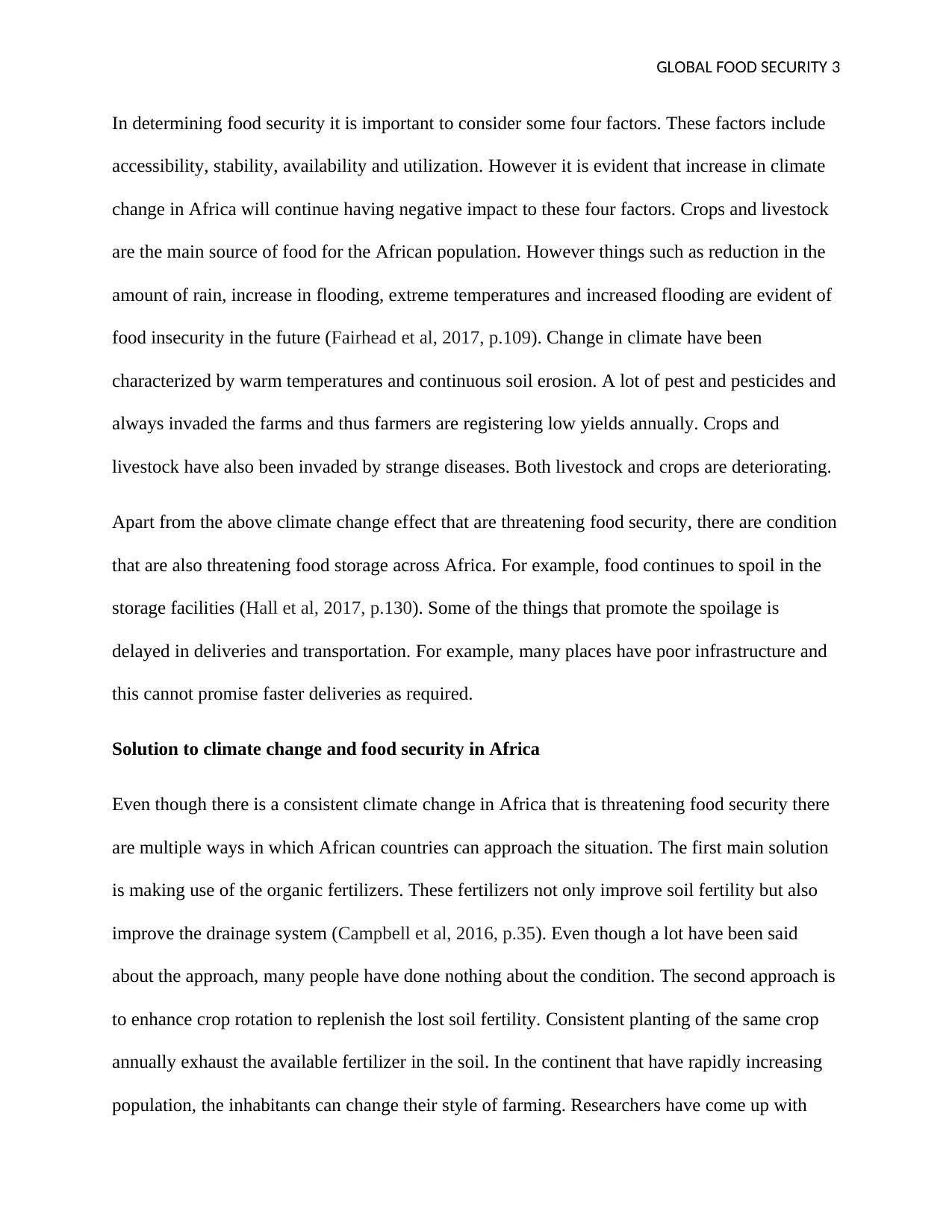
GLOBAL FOOD SECURITY 3
In determining food security it is important to consider some four factors. These factors include
accessibility, stability, availability and utilization. However it is evident that increase in climate
change in Africa will continue having negative impact to these four factors. Crops and livestock
are the main source of food for the African population. However things such as reduction in the
amount of rain, increase in flooding, extreme temperatures and increased flooding are evident of
food insecurity in the future (Fairhead et al, 2017, p.109). Change in climate have been
characterized by warm temperatures and continuous soil erosion. A lot of pest and pesticides and
always invaded the farms and thus farmers are registering low yields annually. Crops and
livestock have also been invaded by strange diseases. Both livestock and crops are deteriorating.
Apart from the above climate change effect that are threatening food security, there are condition
that are also threatening food storage across Africa. For example, food continues to spoil in the
storage facilities (Hall et al, 2017, p.130). Some of the things that promote the spoilage is
delayed in deliveries and transportation. For example, many places have poor infrastructure and
this cannot promise faster deliveries as required.
Solution to climate change and food security in Africa
Even though there is a consistent climate change in Africa that is threatening food security there
are multiple ways in which African countries can approach the situation. The first main solution
is making use of the organic fertilizers. These fertilizers not only improve soil fertility but also
improve the drainage system (Campbell et al, 2016, p.35). Even though a lot have been said
about the approach, many people have done nothing about the condition. The second approach is
to enhance crop rotation to replenish the lost soil fertility. Consistent planting of the same crop
annually exhaust the available fertilizer in the soil. In the continent that have rapidly increasing
population, the inhabitants can change their style of farming. Researchers have come up with
In determining food security it is important to consider some four factors. These factors include
accessibility, stability, availability and utilization. However it is evident that increase in climate
change in Africa will continue having negative impact to these four factors. Crops and livestock
are the main source of food for the African population. However things such as reduction in the
amount of rain, increase in flooding, extreme temperatures and increased flooding are evident of
food insecurity in the future (Fairhead et al, 2017, p.109). Change in climate have been
characterized by warm temperatures and continuous soil erosion. A lot of pest and pesticides and
always invaded the farms and thus farmers are registering low yields annually. Crops and
livestock have also been invaded by strange diseases. Both livestock and crops are deteriorating.
Apart from the above climate change effect that are threatening food security, there are condition
that are also threatening food storage across Africa. For example, food continues to spoil in the
storage facilities (Hall et al, 2017, p.130). Some of the things that promote the spoilage is
delayed in deliveries and transportation. For example, many places have poor infrastructure and
this cannot promise faster deliveries as required.
Solution to climate change and food security in Africa
Even though there is a consistent climate change in Africa that is threatening food security there
are multiple ways in which African countries can approach the situation. The first main solution
is making use of the organic fertilizers. These fertilizers not only improve soil fertility but also
improve the drainage system (Campbell et al, 2016, p.35). Even though a lot have been said
about the approach, many people have done nothing about the condition. The second approach is
to enhance crop rotation to replenish the lost soil fertility. Consistent planting of the same crop
annually exhaust the available fertilizer in the soil. In the continent that have rapidly increasing
population, the inhabitants can change their style of farming. Researchers have come up with
⊘ This is a preview!⊘
Do you want full access?
Subscribe today to unlock all pages.

Trusted by 1+ million students worldwide
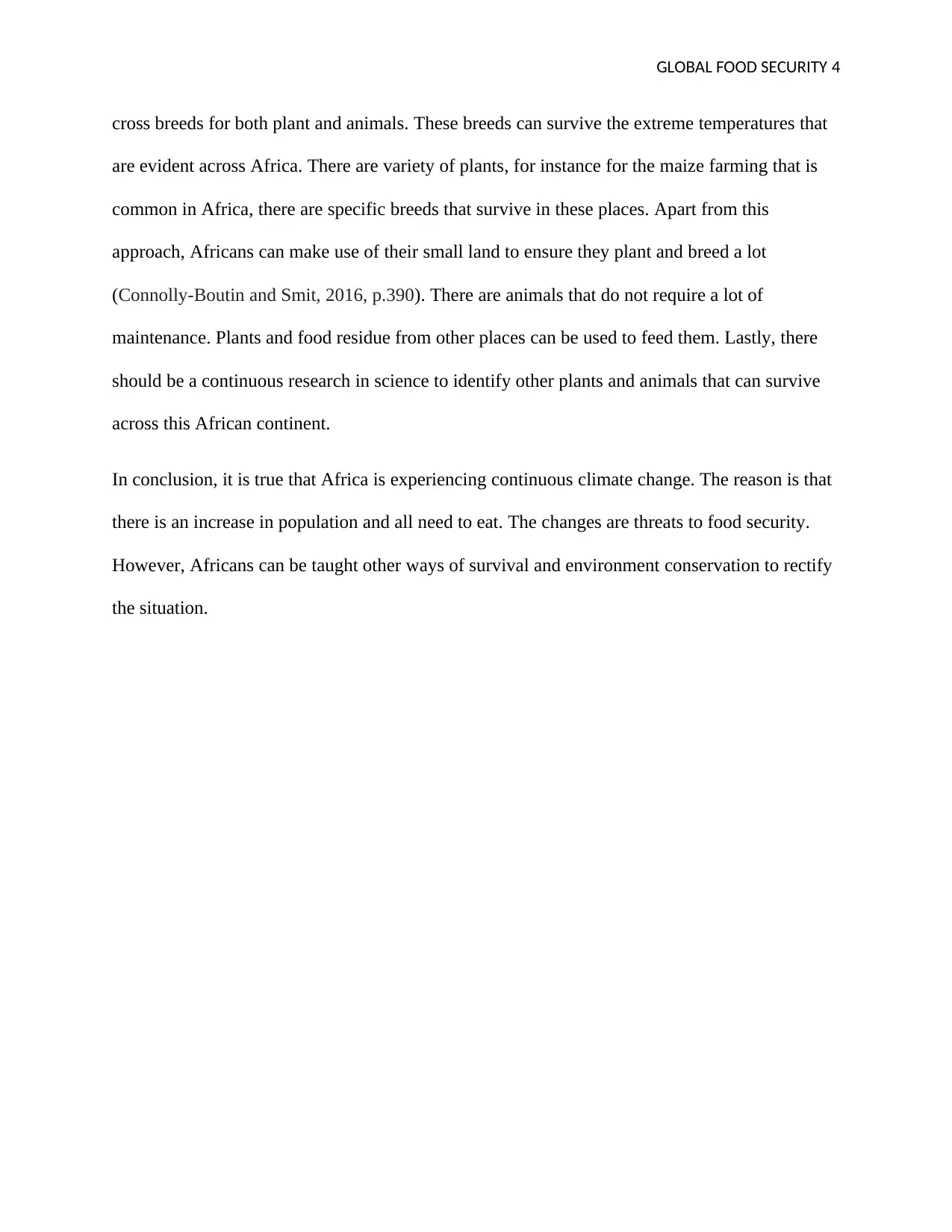
GLOBAL FOOD SECURITY 4
cross breeds for both plant and animals. These breeds can survive the extreme temperatures that
are evident across Africa. There are variety of plants, for instance for the maize farming that is
common in Africa, there are specific breeds that survive in these places. Apart from this
approach, Africans can make use of their small land to ensure they plant and breed a lot
(Connolly-Boutin and Smit, 2016, p.390). There are animals that do not require a lot of
maintenance. Plants and food residue from other places can be used to feed them. Lastly, there
should be a continuous research in science to identify other plants and animals that can survive
across this African continent.
In conclusion, it is true that Africa is experiencing continuous climate change. The reason is that
there is an increase in population and all need to eat. The changes are threats to food security.
However, Africans can be taught other ways of survival and environment conservation to rectify
the situation.
cross breeds for both plant and animals. These breeds can survive the extreme temperatures that
are evident across Africa. There are variety of plants, for instance for the maize farming that is
common in Africa, there are specific breeds that survive in these places. Apart from this
approach, Africans can make use of their small land to ensure they plant and breed a lot
(Connolly-Boutin and Smit, 2016, p.390). There are animals that do not require a lot of
maintenance. Plants and food residue from other places can be used to feed them. Lastly, there
should be a continuous research in science to identify other plants and animals that can survive
across this African continent.
In conclusion, it is true that Africa is experiencing continuous climate change. The reason is that
there is an increase in population and all need to eat. The changes are threats to food security.
However, Africans can be taught other ways of survival and environment conservation to rectify
the situation.
Paraphrase This Document
Need a fresh take? Get an instant paraphrase of this document with our AI Paraphraser
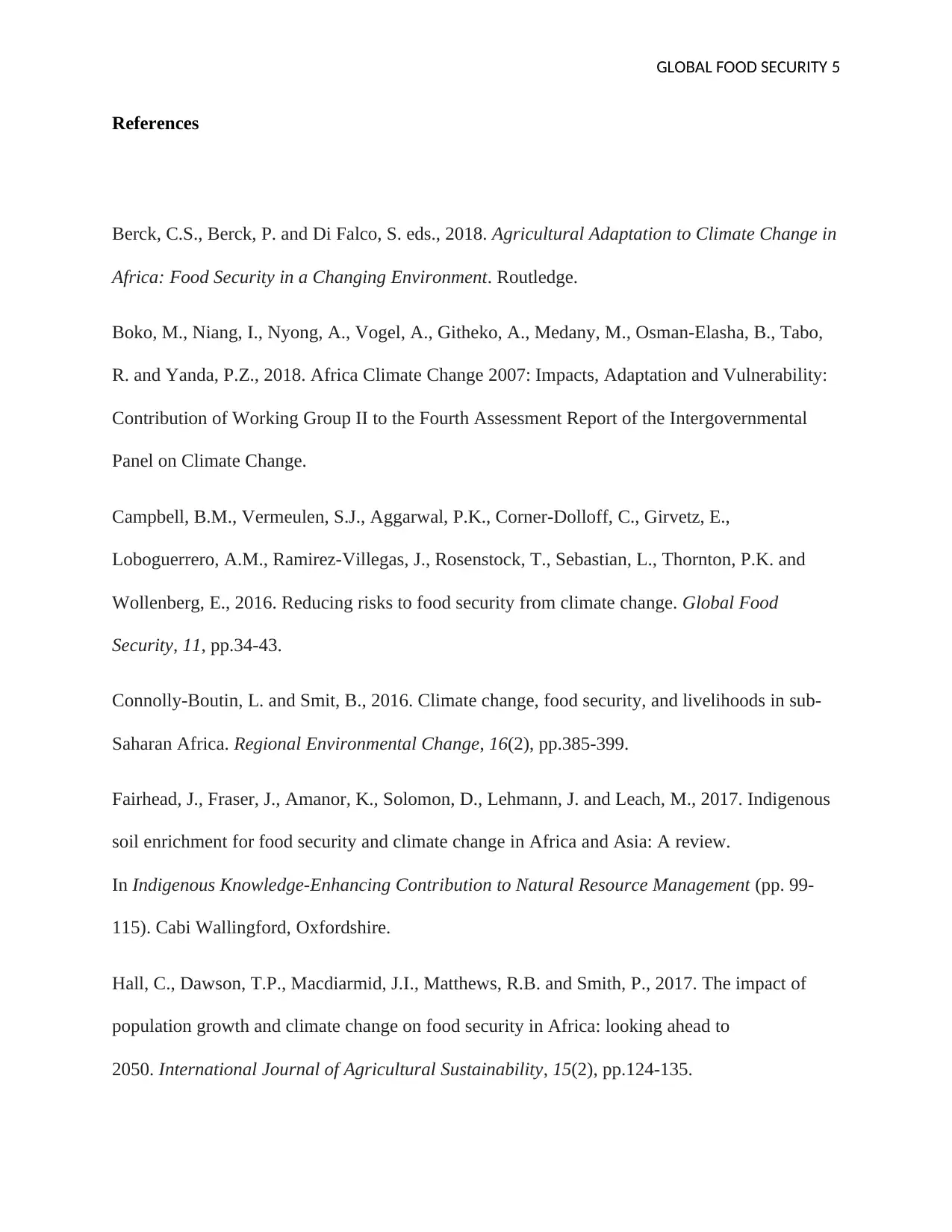
GLOBAL FOOD SECURITY 5
References
Berck, C.S., Berck, P. and Di Falco, S. eds., 2018. Agricultural Adaptation to Climate Change in
Africa: Food Security in a Changing Environment. Routledge.
Boko, M., Niang, I., Nyong, A., Vogel, A., Githeko, A., Medany, M., Osman-Elasha, B., Tabo,
R. and Yanda, P.Z., 2018. Africa Climate Change 2007: Impacts, Adaptation and Vulnerability:
Contribution of Working Group II to the Fourth Assessment Report of the Intergovernmental
Panel on Climate Change.
Campbell, B.M., Vermeulen, S.J., Aggarwal, P.K., Corner-Dolloff, C., Girvetz, E.,
Loboguerrero, A.M., Ramirez-Villegas, J., Rosenstock, T., Sebastian, L., Thornton, P.K. and
Wollenberg, E., 2016. Reducing risks to food security from climate change. Global Food
Security, 11, pp.34-43.
Connolly-Boutin, L. and Smit, B., 2016. Climate change, food security, and livelihoods in sub-
Saharan Africa. Regional Environmental Change, 16(2), pp.385-399.
Fairhead, J., Fraser, J., Amanor, K., Solomon, D., Lehmann, J. and Leach, M., 2017. Indigenous
soil enrichment for food security and climate change in Africa and Asia: A review.
In Indigenous Knowledge-Enhancing Contribution to Natural Resource Management (pp. 99-
115). Cabi Wallingford, Oxfordshire.
Hall, C., Dawson, T.P., Macdiarmid, J.I., Matthews, R.B. and Smith, P., 2017. The impact of
population growth and climate change on food security in Africa: looking ahead to
2050. International Journal of Agricultural Sustainability, 15(2), pp.124-135.
References
Berck, C.S., Berck, P. and Di Falco, S. eds., 2018. Agricultural Adaptation to Climate Change in
Africa: Food Security in a Changing Environment. Routledge.
Boko, M., Niang, I., Nyong, A., Vogel, A., Githeko, A., Medany, M., Osman-Elasha, B., Tabo,
R. and Yanda, P.Z., 2018. Africa Climate Change 2007: Impacts, Adaptation and Vulnerability:
Contribution of Working Group II to the Fourth Assessment Report of the Intergovernmental
Panel on Climate Change.
Campbell, B.M., Vermeulen, S.J., Aggarwal, P.K., Corner-Dolloff, C., Girvetz, E.,
Loboguerrero, A.M., Ramirez-Villegas, J., Rosenstock, T., Sebastian, L., Thornton, P.K. and
Wollenberg, E., 2016. Reducing risks to food security from climate change. Global Food
Security, 11, pp.34-43.
Connolly-Boutin, L. and Smit, B., 2016. Climate change, food security, and livelihoods in sub-
Saharan Africa. Regional Environmental Change, 16(2), pp.385-399.
Fairhead, J., Fraser, J., Amanor, K., Solomon, D., Lehmann, J. and Leach, M., 2017. Indigenous
soil enrichment for food security and climate change in Africa and Asia: A review.
In Indigenous Knowledge-Enhancing Contribution to Natural Resource Management (pp. 99-
115). Cabi Wallingford, Oxfordshire.
Hall, C., Dawson, T.P., Macdiarmid, J.I., Matthews, R.B. and Smith, P., 2017. The impact of
population growth and climate change on food security in Africa: looking ahead to
2050. International Journal of Agricultural Sustainability, 15(2), pp.124-135.
1 out of 5
Related Documents
Your All-in-One AI-Powered Toolkit for Academic Success.
+13062052269
info@desklib.com
Available 24*7 on WhatsApp / Email
![[object Object]](/_next/static/media/star-bottom.7253800d.svg)
Unlock your academic potential
Copyright © 2020–2026 A2Z Services. All Rights Reserved. Developed and managed by ZUCOL.





